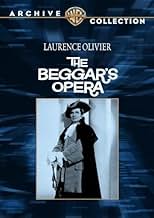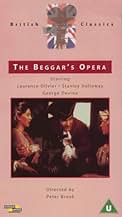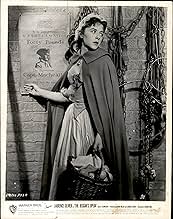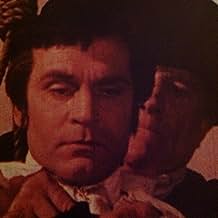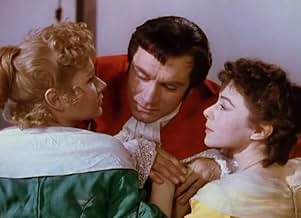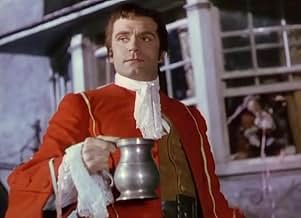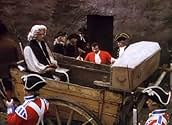Agrega una trama en tu idiomaWhen the composer of an opera about a swashbuckling, wenching highwayman meets his hero's real-life counterpart, he's disappointed with his lack of dash.When the composer of an opera about a swashbuckling, wenching highwayman meets his hero's real-life counterpart, he's disappointed with his lack of dash.When the composer of an opera about a swashbuckling, wenching highwayman meets his hero's real-life counterpart, he's disappointed with his lack of dash.
- Dirección
- Guionistas
- Elenco
- Dirección
- Guionistas
- Todo el elenco y el equipo
- Producción, taquilla y más en IMDbPro
Opiniones destacadas
This was a very enjoyable movie especially if you like period pieces and/or musicals. Hearing Laurence Olivier sing is reason enough to watch this. The cinematography is outstanding and the movie as a whole is very colorful.
Obviously, the song "Mack the Knife" made famous by Bobby Darin, Louis Armstrong and Frank Sinatra is based on this opera/movie. MacHeath is in the opera/movie as is Jenny Diver and Sukey Tawdrey. Louie Miller, Lotte Lenya and Lucy Brown are mentioned in the song (and not in the opera/movie) but, after all, MacHeath was a notorious highwayman and ladies' man.
Obviously, the song "Mack the Knife" made famous by Bobby Darin, Louis Armstrong and Frank Sinatra is based on this opera/movie. MacHeath is in the opera/movie as is Jenny Diver and Sukey Tawdrey. Louie Miller, Lotte Lenya and Lucy Brown are mentioned in the song (and not in the opera/movie) but, after all, MacHeath was a notorious highwayman and ladies' man.
The Beggar's Opera has so much going for it. The author, John Gay placed it squarely in an underworld of thieves, whores, liars, drunkards, double-crossers, and corrupt officials. He gave them a witty voice, where moral values are reversed, and most importantly he gave them newly worded songs set to recent popular tunes.
The Beggar's Opera continues to be an important work, that has been raided by later writers; most importantly by Brecht who adapted its main elements as The Threepenny Opera; and also by writers such as Dennis Potter (Pennies From Heaven clearly borrows heavily from from The Beggar's Opera, down to the final twist).
This is a film that should work well as a film-of-the-stage, for there is always a sense that the characters are trapped in their little world, in each other's pocket, and all knowing each other's business. But Peter Brook tries to make the film more cinematic by opening the action out in places. Though this is understandable, it entails some unfortunate compromises. The attempt to inject some new life into this film, with primarily visual scenes and a bit of derring-do action, means that Brook is forced to cut the text severely in places, and the strength of the piece lies in the words Gay wrote, not in the pictures that Brook creates. The film works well where the original text survives and the characters are allowed to speak, but that happens rarely. And Brook also messes about with the twist-ending!
In brief, enough survives of the original to make it worth watching, if there's no better alternative.
The Beggar's Opera continues to be an important work, that has been raided by later writers; most importantly by Brecht who adapted its main elements as The Threepenny Opera; and also by writers such as Dennis Potter (Pennies From Heaven clearly borrows heavily from from The Beggar's Opera, down to the final twist).
This is a film that should work well as a film-of-the-stage, for there is always a sense that the characters are trapped in their little world, in each other's pocket, and all knowing each other's business. But Peter Brook tries to make the film more cinematic by opening the action out in places. Though this is understandable, it entails some unfortunate compromises. The attempt to inject some new life into this film, with primarily visual scenes and a bit of derring-do action, means that Brook is forced to cut the text severely in places, and the strength of the piece lies in the words Gay wrote, not in the pictures that Brook creates. The film works well where the original text survives and the characters are allowed to speak, but that happens rarely. And Brook also messes about with the twist-ending!
In brief, enough survives of the original to make it worth watching, if there's no better alternative.
When this movie opened it scarcely caused a ripple in Britain and even less so in the U.S. I don't know why. It's a telling of John Gay's great work written in 1728, and the play was a blockbuster 280 years ago. It's supposed to be the first English "opera" that told a story through song and which was aimed to entertain the people. Gay took melodies wherever he found them, wrote lyrics to them to advance the storyline, and had a hit. And in another version, it still is. The Threepenny Opera by Kurt Weill and Bertolt Brecht (with Blitzstein's redone lyrics) is a fixture in theaters, and Mack the Knife is still a popular song.
Lawrence Olivier plays Macheath, a rollicking highwayman with "wives" all over London. He has two in particular, Polly Peachum, the daughter of his fence, and Lucy Lockit, the daughter of his jailer. The story of Macheath's adventures, captures and escapes are all told in song. There are horse riding songs, love songs, gambling songs, longing songs, lustful songs. The story starts in a London prison where Macheath awaits hanging. A beggar just tossed into the prison has written an opera about Macheath. He starts to tell it to the inmates and the movie takes off.
The songs are great fun and the style of the movie is very much the look of 18th century London. You can feel the fleas in the wigs, the lice in the clothes, the sheen of greasy lips, the stink of unwashed bodies.
And there are some sharp lines. "A miser might as well be satisfied with one guinea as I with one wife." "Love is a misfortune that can happen even to an indiscreet girl." "I can tell by your kiss that your gin is excellent." And when pointing out that consummation needn't wait for marriage, "Friends should not insist on ceremony."
Olivier does a masterful job, handling his own stunts, horse work and, most bravely, his own singing. He's good. On the day of Macheath's hanging, he's carted out to the gallows, sitting jauntily on his casket. While a grim-faced preacher is screaming at him to repent, he's sweeping up wenches to kiss, downing tankards of ale held up to him, and making a little girl laugh while bouncing her on his knee. Olivier plays it with great verve.
And while there's not exactly a reprieve, there is a joyous escape.
If you like Olivier, if you like things British, if you like quirky films that will probably be forgotten, this is worth seeing.
Lawrence Olivier plays Macheath, a rollicking highwayman with "wives" all over London. He has two in particular, Polly Peachum, the daughter of his fence, and Lucy Lockit, the daughter of his jailer. The story of Macheath's adventures, captures and escapes are all told in song. There are horse riding songs, love songs, gambling songs, longing songs, lustful songs. The story starts in a London prison where Macheath awaits hanging. A beggar just tossed into the prison has written an opera about Macheath. He starts to tell it to the inmates and the movie takes off.
The songs are great fun and the style of the movie is very much the look of 18th century London. You can feel the fleas in the wigs, the lice in the clothes, the sheen of greasy lips, the stink of unwashed bodies.
And there are some sharp lines. "A miser might as well be satisfied with one guinea as I with one wife." "Love is a misfortune that can happen even to an indiscreet girl." "I can tell by your kiss that your gin is excellent." And when pointing out that consummation needn't wait for marriage, "Friends should not insist on ceremony."
Olivier does a masterful job, handling his own stunts, horse work and, most bravely, his own singing. He's good. On the day of Macheath's hanging, he's carted out to the gallows, sitting jauntily on his casket. While a grim-faced preacher is screaming at him to repent, he's sweeping up wenches to kiss, downing tankards of ale held up to him, and making a little girl laugh while bouncing her on his knee. Olivier plays it with great verve.
And while there's not exactly a reprieve, there is a joyous escape.
If you like Olivier, if you like things British, if you like quirky films that will probably be forgotten, this is worth seeing.
John Gay's original Beggar's Opera was a spoof of the high-blown operas of his day. The Olivier film is a spoof of--movie musicals! Sir Laurence sings on horseback; people burst into arias at the worst possible time. The plot goes from the absurd to the absurd. However, if the viewer tries to see it "straight," she will be confused and put off. I don't know why this delightful film is not available on laserdisc or even videotape. Someone should dig it out of the vault and re-introduce it to the world.
Multi-nominated Laurence Olivier is the rogue Captain MacHeath. Hugh Griffith is the beggar. and they are both in the the royal prison. Griffith is writing an opera about the wild adventures of such a wild man as MacHeath. and now we're in the flashback, showing what led them to their current predicament. i'm not surprised that this was a flop; it's played so straight.. it needed a hook, or bigger humor. or less singing! i know, it's an opera. still, they break into song even before the drop of a hat, and then sing about the drop and the hat. it's a lot. This was actually produced by Olivier... (my favorite Olivier film is Rebecca; its awesome. and my favorite Hugh Griffith film is Start the Revolution without Me. but he won the oscar for Ben Hur.) Directed by Peter Brook. Original opera by John Gay... lived 1685 to 1732. died young at 47 . and this story has been remade numerous times. it's a bit purient, if you read up on it, and clearly was toned down in some versions, "for decency". shows on Turner Classics now and then. not for me, but some will enjoy the music combined with story.
¿Sabías que…?
- Trivia"The Beggar's Opera" is a ballad opera popular during the early eighteenth century, which used the music of popular folk songs, ballads and church hymns set to new lyrics to satirize social customs, mores, and especially Italian opera. It copied the three act Italian operatic format, rather than the then-custom of five acts.
- Citas
Captain MacHeath: [Hearing a woman singing] Women!... I love the sex!... and a man who loves money might as well be contented with one guinea... as I with one woman.
- Créditos curiososUnusually, the ghost vocalists for the non-singing actors were given billing in the end credits.
- ConexionesFeatured in Carry on Forever: Episode #1.1 (2015)
Selecciones populares
Inicia sesión para calificar y agrega a la lista de videos para obtener recomendaciones personalizadas
Detalles
Taquilla
- Presupuesto
- GBP 500,000 (estimado)
- Tiempo de ejecución1 hora 34 minutos
- Relación de aspecto
- 1.37 : 1
Contribuir a esta página
Sugiere una edición o agrega el contenido que falta

Principales brechas de datos
By what name was The Beggar's Opera (1953) officially released in India in English?
Responda
